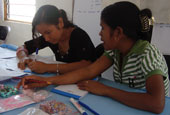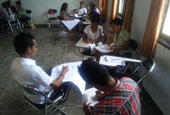Small Island Developing States
Gaining skills for a new life in Timor Leste
Empowering youth through education and training is key to achieving sustainable development in small island developing states like Timor Leste, where youth unemployment has reached 21.6 per cent.
DILI (Timor Leste) – When Beatriz de Santos dropped out of school to take care of her seven siblings, she thought that this was the end of her education and dreams of a better life.
As the oldest daughter in a family of poor farmers in the village of Ermera, she was expected to look after seven smaller brothers and sisters rather than going to school. To support the family, she left Ermera last year for the lights of the capital Dili.
But De Santos was not just looking for a job. She also hoped to gain some skills which would equip her for work other than cooking or housekeeping … jobs that young women like her arriving in Dili from rural areas would normally find.
And she was lucky. Through a friend she heard that the government was offering a range of courses for young people with low education levels.
“I was so grateful for this opportunity. I prayed to God every evening and thanked him,” she says.
De Santos took a free English course with an NGO and finally enrolled in a tourism and hospitality course offered by the Secretariat of State for Vocational Training and Employment Policy (SEPFOPE) in Timor Leste.
She attended one of the foundation courses designed to obtain an entry level certificate, which provides a gateway to higher level vocational training. The courses combine language, numeracy and employment skills for various industry sectors, including construction, agriculture, administration and finance, tourism and small business.
But things turned out to be more difficult than she thought. To finance her stay in the capital, she had to spend several hours a day on housework and cooking for her landlady besides the training.
“My landlady was angry with me all the time. She did not want me to attend the training. She wanted me to work for her all the time,” she explains.
But De Santos refused to give up and rather tried to find another house-cleaning job, with a more understanding owner. That way she was able to complete her Certificate in Hospitality and Tourism.
The Certificate crowned one of the first formal tourism and hospitality courses available in Timor Leste. Before, hotel and tourism sector staff were either trained on the job, or – in some cases – overseas.
"The aim of these courses is to provide young Timorese – especially young women – with training and employment possibilities they would otherwise hardly access. Women such as Beatriz de Santos are far less likely to be employed in skilled jobs, due to expectations that they fulfil traditional gender roles … looking after children, getting married and having a family,” explains Roberto Pes, ILO Head of Mission for Timor Leste.
Women comprised a little over one third of the country’s labour force in 2013.
The course De Santos attended was part of the training and employment service programmes conducted by the ILO in collaboration with SEFOPE through the Training and Employment Support Programme (TESP).
Funded by the Australian government, the two-year project provides nationally certified training courses, and develops labour force and employment policies and strategies to promote a modern and diversifying economy.
“As a central pillar of ILO efforts to enhance youth employment in Timor-Leste, TESP focused particularly on training and careers counselling for female youth. In 2013, around 2,067 young Timorese, or some 51 per cent, trained under accredited training programmes in eight different industries were women,” says Pes.
According to the ILO expert, the lack of productive and quality work opportunities represents a serious cost not just to the young people themselves, but also to their families, societies and economies. More than 70 per cent of employed youth are in informal employment.
The work deficits for young people can make them vulnerable to external influences and which potentially can lead to rising levels of crime, violence and political extremism in a country which is still in the process of building its institutions.
“The Third International Conference on Small Island Developing States to be held from 1 to 4 September 2014 in Apia, Samoa, will look at ways to ensure the sustainable development of small island states. Empowering youth through education and training will be key to sustainable development in these small and vulnerable developing nations,” concludes Peter van Rooij, Director of the ILO office in Jakarta, Indonesia.
As the oldest daughter in a family of poor farmers in the village of Ermera, she was expected to look after seven smaller brothers and sisters rather than going to school. To support the family, she left Ermera last year for the lights of the capital Dili.
But De Santos was not just looking for a job. She also hoped to gain some skills which would equip her for work other than cooking or housekeeping … jobs that young women like her arriving in Dili from rural areas would normally find.
And she was lucky. Through a friend she heard that the government was offering a range of courses for young people with low education levels.
“I was so grateful for this opportunity. I prayed to God every evening and thanked him,” she says.
De Santos took a free English course with an NGO and finally enrolled in a tourism and hospitality course offered by the Secretariat of State for Vocational Training and Employment Policy (SEPFOPE) in Timor Leste.
She attended one of the foundation courses designed to obtain an entry level certificate, which provides a gateway to higher level vocational training. The courses combine language, numeracy and employment skills for various industry sectors, including construction, agriculture, administration and finance, tourism and small business.
But things turned out to be more difficult than she thought. To finance her stay in the capital, she had to spend several hours a day on housework and cooking for her landlady besides the training.
“My landlady was angry with me all the time. She did not want me to attend the training. She wanted me to work for her all the time,” she explains.
But De Santos refused to give up and rather tried to find another house-cleaning job, with a more understanding owner. That way she was able to complete her Certificate in Hospitality and Tourism.
The Certificate crowned one of the first formal tourism and hospitality courses available in Timor Leste. Before, hotel and tourism sector staff were either trained on the job, or – in some cases – overseas.
Promoting a modern economy
"The aim of these courses is to provide young Timorese – especially young women – with training and employment possibilities they would otherwise hardly access. Women such as Beatriz de Santos are far less likely to be employed in skilled jobs, due to expectations that they fulfil traditional gender roles … looking after children, getting married and having a family,” explains Roberto Pes, ILO Head of Mission for Timor Leste.
 |
The course De Santos attended was part of the training and employment service programmes conducted by the ILO in collaboration with SEFOPE through the Training and Employment Support Programme (TESP).
Funded by the Australian government, the two-year project provides nationally certified training courses, and develops labour force and employment policies and strategies to promote a modern and diversifying economy.
 |
According to the ILO expert, the lack of productive and quality work opportunities represents a serious cost not just to the young people themselves, but also to their families, societies and economies. More than 70 per cent of employed youth are in informal employment.
The work deficits for young people can make them vulnerable to external influences and which potentially can lead to rising levels of crime, violence and political extremism in a country which is still in the process of building its institutions.
“The Third International Conference on Small Island Developing States to be held from 1 to 4 September 2014 in Apia, Samoa, will look at ways to ensure the sustainable development of small island states. Empowering youth through education and training will be key to sustainable development in these small and vulnerable developing nations,” concludes Peter van Rooij, Director of the ILO office in Jakarta, Indonesia.